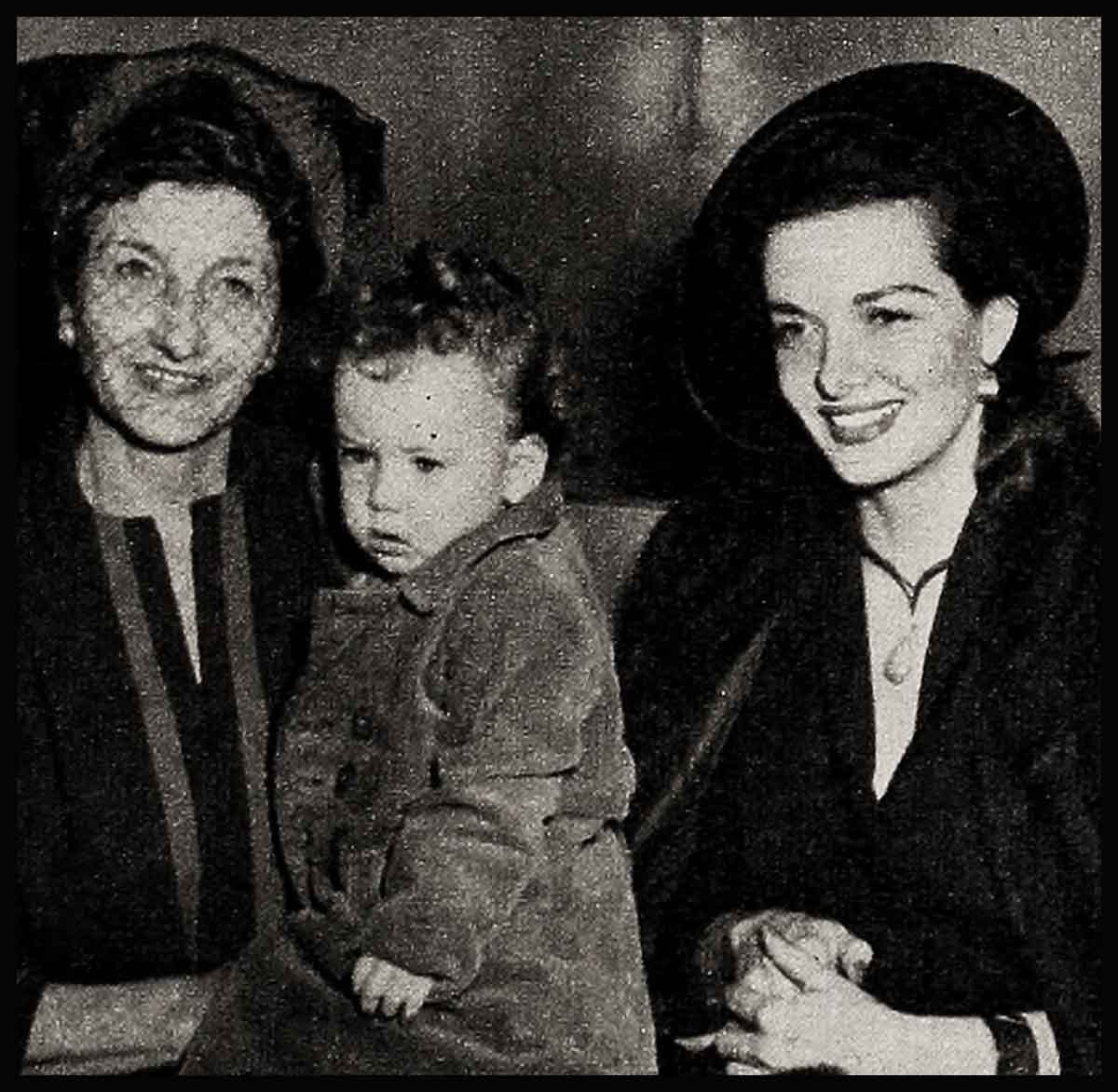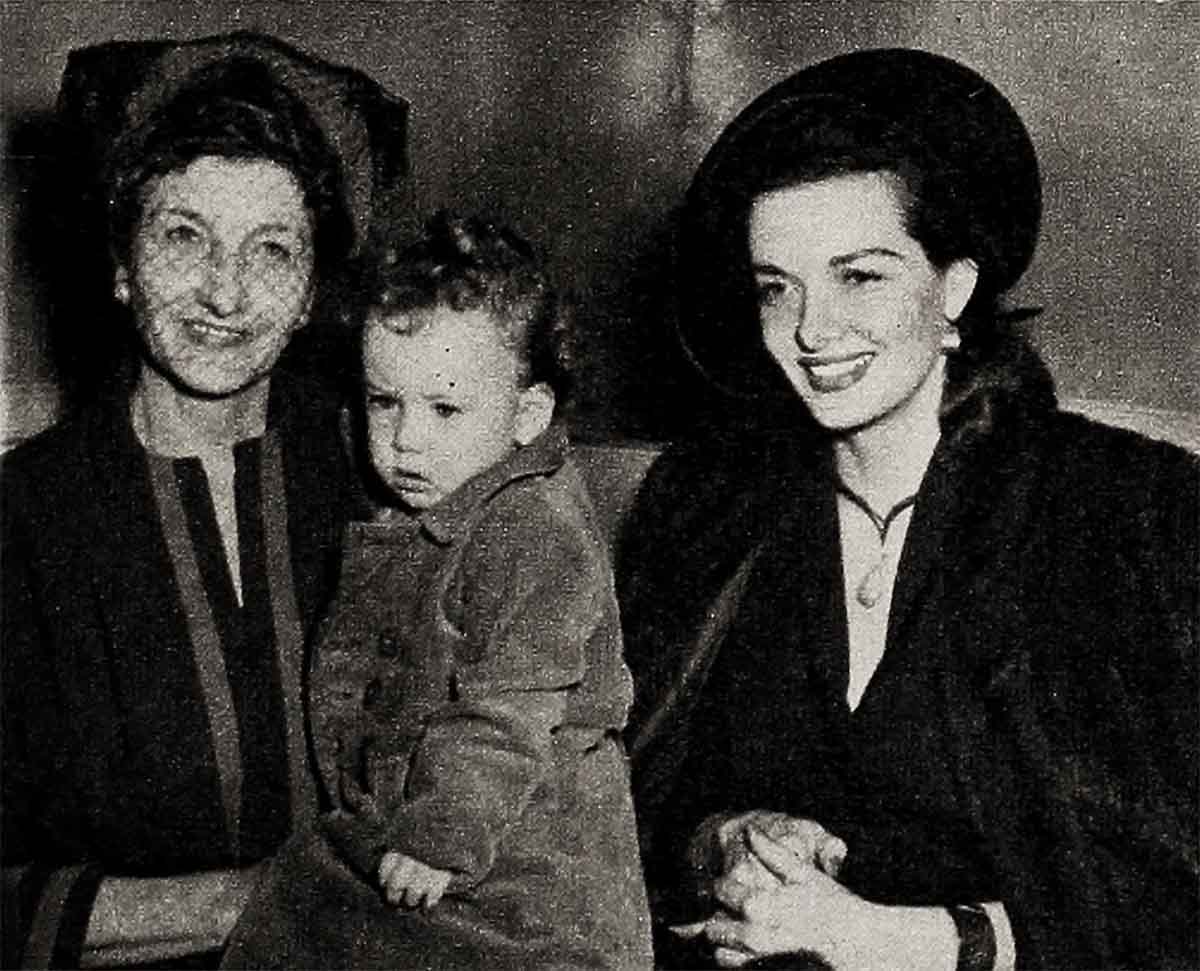
Jane Russell’s Tommy
When Jane Russell was. here several months ago filming Gentlemen Marry Brunettes, she captured in one move of compassion the heart of virtually every mother in the British Isles.
Against the counsel of supposedly wise heads, Jane met with Mrs. Florrie Kavanagh, attractive, Irish-born wife of a local carpenter.
In 1951 Mrs. Kavanagh had given her baby son to Jane for adoption. Now she wanted to know how little Tommy liked Hollywood and how he was getting along.
Jane was advised against establishing or continuing any liaison with the parents of her adopted son. But by nature the brunette beauty is about as tough as butter.
When Florrie Kavanagh rang the Dorchester Hotel and asked about Tommy, Jane told Florrie to meet her at her lawyer’s office. The meeting was supposed to be a strict secret. Within twenty-four hours all of London knew about it.
Arriving at the lawyer’s office, Mrs. Kavanagh, dressed in her new grey skirt and red corduroy topcoat, was nervous. Jane greeted her warmly, put her at ease. Then she handed Florrie a batch of color slides showing four-and-a-half-year-old Tommy playing in California’s sun-drenched San Fernando Valley.
As she peered at the slides through a viewer, Mrs. Kavanagh smiled, but her eyes grew moist.
“May I keep these?” she asked softly. Jane nodded, and for a while the woman talked—about Tommy, of course.
That night in her tenement flat overlooking Lambeth, a working class district here, Florrie showed the pictures of Tommy to her three other children.
“Are you sorry, Mama,” one asked, “that you gave Tommy away?”

Florrie Kavanagh shook her pretty head. “Jane Russell,” she asserted, “is a truly wonderful person. She’s the only mother Tommy knows. I’m glad I did it.”
Four years ago, reporters asked Florrie Kavanagh why she did it, why she gave her baby to Jane to adopt.
“Is it because of poverty?” she was asked.
“No,” she explained, “it’s because my husband and I want him to have a better chance in life than we can give him.
“But my neighbors,” she added, “are saying other things—cruel, spiteful things. They’re saying, ‘Fancy! Florrie Kavanagh is selling her baby to a film star.’ And ‘I wonder how much she got for her baby?’
“I want you to know that I never asked or received one penny from Jane Russell. My last words to her when she went into the airplane with Tommy at London Airport were, ‘I would like you to have this baby for always. I hope you will always love him.’ ”
When Jane flew away to New York with baby Tommy in 1951, a well-publicized row began in the House of Commons. Marcus Lipton, a member of Parliament, said, “We don’t want to export babies to Hollywood or anywhere else. These bundles from Britain have got to stop.”
Presently, Mr. and Mrs. Michael Kavanagh were called into court, charged with violating the Adoption Act. They told the magistrate that what they had done was entirely for little Tommy’s benefit. They even showed the judge the warm and kind letters they had recently received from Jane Russell.
Sir Laurence Dunne read them and handed them back. “She must be a very wonderful woman,” he agreed. The Kavanaghs were discharged. But the hue and cry resulting from the case aroused in Jane Russell a desire to do something to facilitate the adoption of foreign-born children.
She therefore founded WAIF—Women’s Adoption-International Fund—one of the most humanitarian child-adoption agencies in existence.
It is to this charity that she now gives her time, her effort and a good deal of her money. As chairman of war she works long hours making speeches, raising funds, trying to get homeless children into childless homes.
In the years to come it may well be that Jane Russell will be remembered more for her WAIF work than for any of her films. Certainly she will be remembered as a good, kind, charitable human being.
THE END
—BY KEVIN BURKE
It is a quote. MODERN SCREEN MAGAZINE MAY 1955




